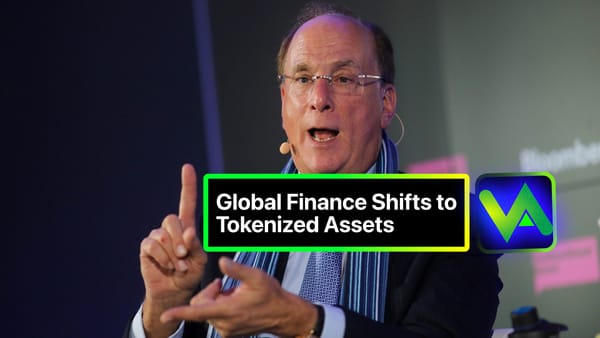
Global Finance Shifts to Tokenized Assets
Asset tokenization, the process of converting real world assets into digital tokens on a blockchain, is rapidly gaining traction among major companies across various industries. This approach to asset management promises to revolutionize traditional finance by increasing liquidity, reducing costs, and democratizing access to previously illiquid assets. From BlackRock to Citibank and UBS, these global finance giants are betting big on the concept of converting real-world assets into digital tokens on blockchain networks.
Learn more about tokenization in our article: What is Tokenization?
BlackRock: Leading the Charge in Tokenized Funds
BlackRock, the world's largest asset manager with over $10 trillion in assets under management, has taken a significant step towards tokenization. In March 2024, the firm filed with the US Securities and Exchange Commission (SEC) to offer a tokenized fund.
The BlackRock USD Institutional Digital Liquidity Fund ("BUIDL") aims to provide institutional investors with exposure to a diverse range of tokenized assets. BUIDL is a money market fund that invests in highly liquid assets such as U.S. Treasury bills, repurchase agreements, and cash.
The fund aims to provide institutional investors with exposure to tokenized assets while offering the benefits of blockchain technology, such as increased efficiency, transparency, and 24/7 trading.
I believe the next generation for markets, the next generation for securities, will be tokenization of securities.
Larry Fink, CEO of BlackRock
Citibank: Exploring the Potential of Private Fund Tokenization
Citibank, one of the largest banking institutions in the world, has also recognized the transformative potential of tokenization. In a recent proof-of-concept simulation, Citibank successfully demonstrated how a private equity fund can be tokenized and custodied on a blockchain network. This simulation, conducted in collaboration with WisdomTree, showcased the compatibility of tokenized assets with existing bank systems and regulatory frameworks.
Citibank's exploration of private fund tokenization could pave the way for increased adoption of blockchain technology on Wall Street. By enabling the issuance and custody of tokenized versions of private equity funds, Citibank aims to enhance transparency, streamline transactions, and provide clients with greater access to alternative investment opportunities.
UBS: Embracing the Tokenization of Real-World Assets
UBS, the Swiss banking giant, has also recognized the potential of tokenization to transform the financial industry. The bank has been actively exploring the use of blockchain technology to tokenize a wide range of assets, including bonds, equities, and real estate.
In a recent report, UBS highlighted the benefits of tokenization, such as increased liquidity, fractional ownership, and reduced transaction costs. The bank believes that tokenization could unlock trillions of dollars in currently illiquid assets, making them more accessible to a broader range of investors.
UBS has also been collaborating with other financial institutions and technology providers to develop industry standards and best practices for tokenization. By working towards a common framework, UBS aims to ensure the interoperability and security of tokenized assets across different blockchain networks.
The Tokenization Landscape
The growing interest in tokenization among major financial institutions reflects a broader trend in the industry. According to a recent study by Citi, the tokenization market could reach $5 trillion by 2030, encompassing a wide range of assets, from real estate and private equity to art and collectibles.
However, the path to widespread adoption of tokenization is not without challenges. Regulatory uncertainty remains a significant hurdle, as financial authorities grapple with the implications of tokenized assets and the need for appropriate oversight. Additionally, the lack of standardization and interoperability across different blockchain networks could hinder the seamless transfer and trading of tokenized assets.
Despite these challenges, the potential benefits of tokenization are too significant to ignore. By enabling fractional ownership, increasing liquidity, and reducing transaction costs, tokenization has the power to democratize access to a wide range of assets and investment opportunities. As more financial institutions embrace this technology, we can expect to see a gradual transformation of the traditional investment landscape.
The Tokenized Assets Future
The tokenization revolution is well underway, and major financial institutions like BlackRock, Citibank, and UBS are at the forefront of this transformative shift. By leveraging blockchain technology to tokenize real-world assets, these finance giants are paving the way for a more accessible, efficient, and transparent investment ecosystem.
As the regulatory landscape evolves and industry standards emerge, the adoption of tokenization is likely to accelerate. The potential to unlock trillions of dollars in currently illiquid assets and democratize access to investment opportunities is a compelling proposition for both financial institutions and investors alike.
The future of asset ownership is being redefined, and tokenization is the key to unlocking its full potential. As more financial giants embrace this technology, we can expect to see a profound shift in the way we invest, earn, own, and transfer assets in the digital age.